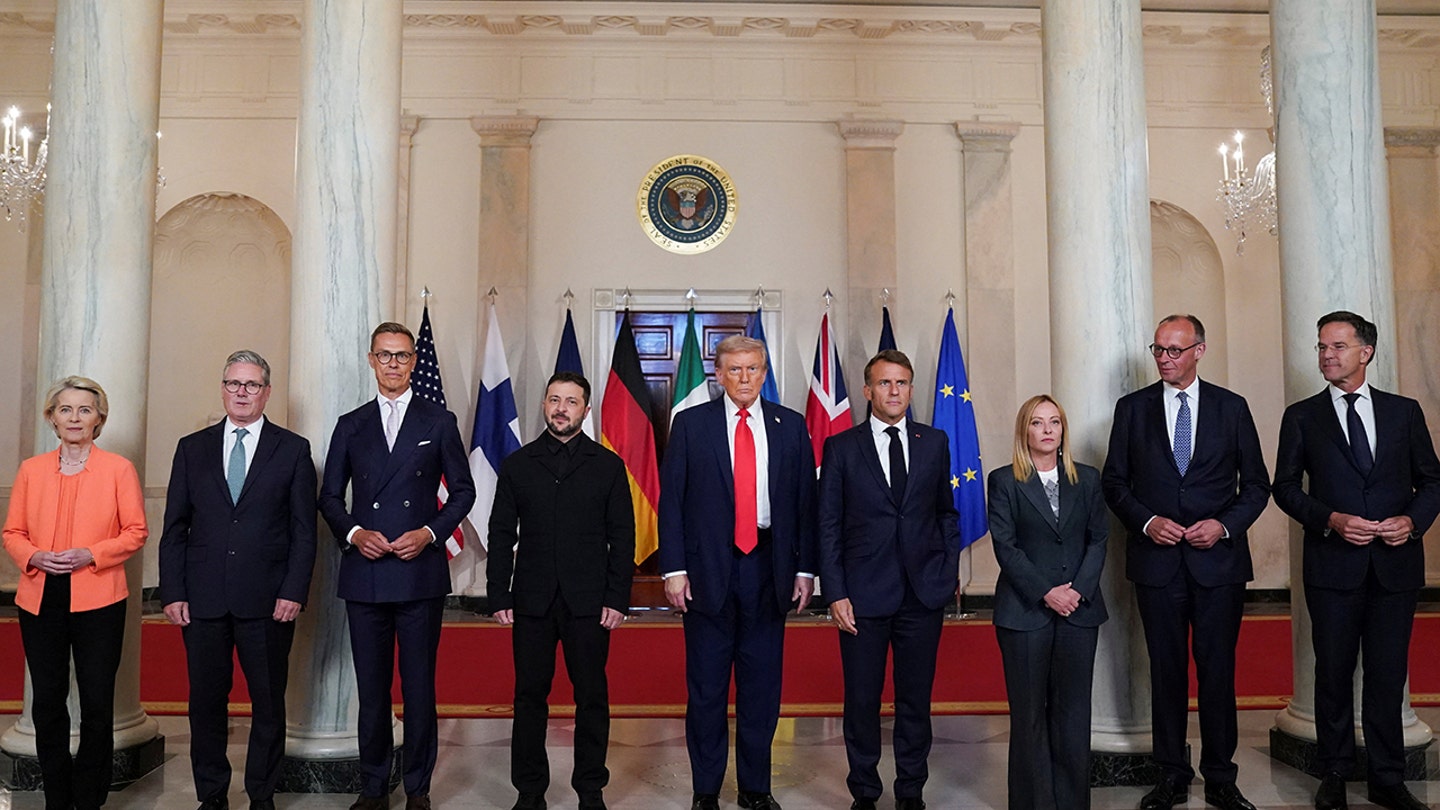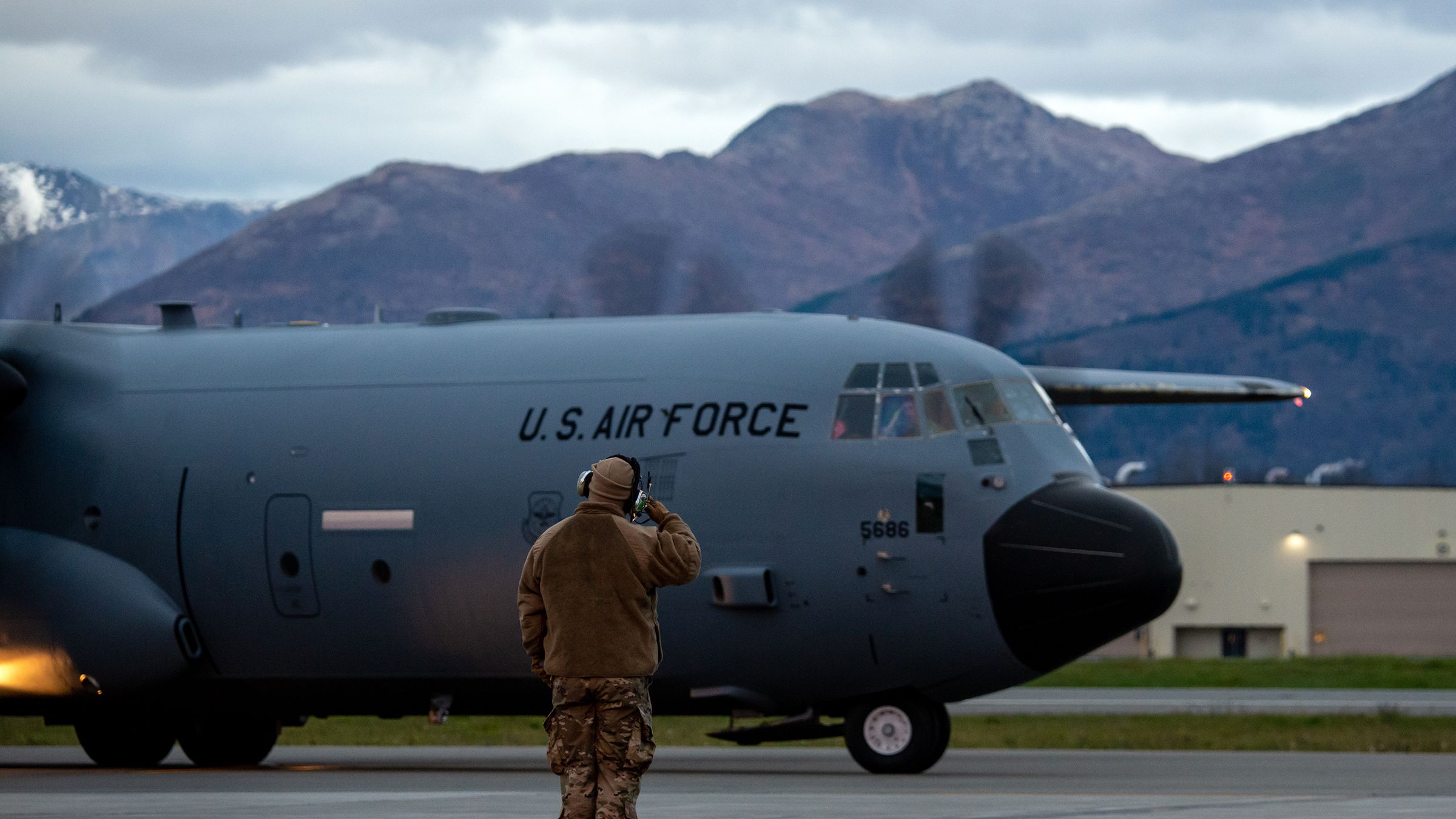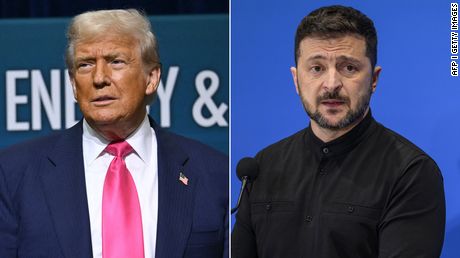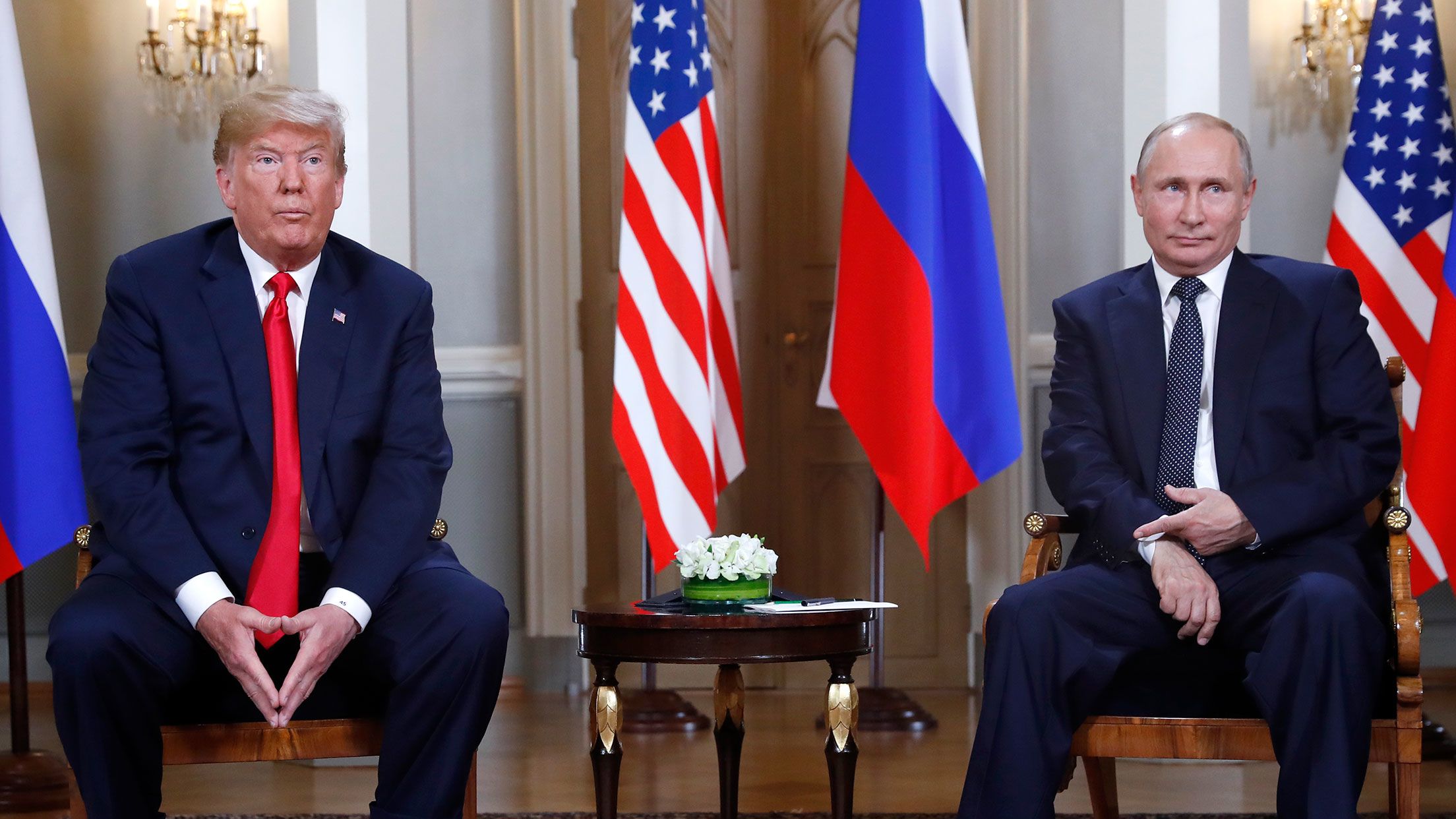
Trump calls White House talks 'very good, early step' toward Russia-Ukraine peace: Here's what's next
Entities mentioned:
- Donald Trump: Influence, Legacy, Recognition
- Volodymyr Zelenskyy: Self-preservation, Unity, Security
- Vladimir Putin: Power, Control, Influence
- JD Vance: Duty, Professional pride
- Marco Rubio: Duty, Influence
- Steve Witkoff: Duty, Professional pride
- Friedrich Merz: Righteousness, Influence
Article Assessment:
Credibility Score: 65/100
Bias Rating: 65/100 (Lean Right)
Sentiment Score: 60/100
Authoritarianism Risk: 40/100 (Generally Democratic)
Bias Analysis:
The article leans right, focusing heavily on Trump's role and quoting him extensively. While it includes other perspectives, the framing tends to portray Trump's efforts in a positive light.
Key metric: International Conflict Resolution
As a social scientist, I analyze that this article portrays a significant shift in the dynamics of the Russia-Ukraine conflict, with Trump positioning himself as a key mediator. The potential for direct talks between Putin and Zelenskyy, facilitated by Trump, represents a major diplomatic development. However, the article also highlights the complexities involved, including the sensitive issue of territorial concessions and the divergent security interests of Ukraine and Russia. The emphasis on European nations providing security guarantees, with U.S. support primarily through arms sales, indicates a potential realignment of international involvement in the conflict. This approach could have far-reaching implications for U.S. foreign policy and global power dynamics.

Big moments in Trump’s negotiations: From a shouting match with Zelensky to threats of sanctions against Russia
Entities mentioned:
- Donald Trump: Power, Legacy, Control
- Vladimir Putin: Power, Control, Self-preservation
- Volodymyr Zelensky: Self-preservation, Duty, Pride
- JD Vance: Duty, Loyalty, Influence
- Steve Witkoff: Duty, Influence, Professional pride
- Mark Rutte: Duty, Unity, Security
- Keith Kellogg: Duty, Influence, Professional pride
- Pete Hegseth: Control, Professional pride, Duty
Article Assessment:
Credibility Score: 75/100
Bias Rating: 55/100 (Center)
Sentiment Score: 35/100
Authoritarianism Risk: 45/100 (Mixed/Neutral)
Bias Analysis:
The article presents a fairly balanced view of events, including both positive and negative aspects of Trump's diplomatic efforts. While it focuses heavily on Trump's actions, it also includes perspectives from other involved parties, maintaining a relatively centrist position.
Key metric: International Relations and Diplomacy
As a social scientist, I analyze that this article highlights the complex dynamics of international diplomacy in the context of the Ukraine-Russia conflict. Trump's approach to negotiations demonstrates a mix of personal diplomacy, economic pressure, and military aid, which has yielded limited success. The frequent shifts in tone and strategy, from threats of sanctions to attempts at personal rapport with Putin, reflect the challenges of navigating a complex geopolitical crisis. The article also underscores the tensions between the US and its allies, particularly Ukraine, as evidenced by the confrontational meeting with Zelensky. This situation impacts US global influence and its ability to mediate international conflicts effectively.

Ahead of summit, Trump questions what’s changed about Putin
Entities mentioned:
- Donald Trump: Ambition, Determination, Legacy
- Vladimir Putin: Power, Control, Ambition
- Volodymyr Zelensky: Self-preservation, Unity, Determination
- Steve Witkoff: Duty, Frustration, Determination
- Kyrylo Budanov: Professional pride, Wariness, Duty
- Angela Stent: Professional pride, Duty, Wariness
- Michael McFaul: Professional pride, Wariness, Duty
Article Assessment:
Credibility Score: 75/100
Bias Rating: 45/100 (Center)
Sentiment Score: 35/100
Authoritarianism Risk: 25/100 (Generally Democratic)
Bias Analysis:
The article presents multiple perspectives, including those of Trump, Putin, European allies, and intelligence officials. It balances Trump's optimism with skepticism from other sources, maintaining a relatively neutral stance.
Key metric: International Diplomatic Relations
As a social scientist, I analyze that this article highlights the complex dynamics surrounding the upcoming summit between Trump and Putin, focusing on Trump's evolving perspective on Putin and the challenges in negotiating an end to the Ukraine conflict. The article emphasizes the skepticism among intelligence communities and European allies regarding Putin's true intentions, suggesting that Putin may use any ceasefire to regroup and potentially escalate the conflict later. Trump's shift from a more naive approach to a more cautious stance towards Putin is noted, indicating a potential change in US-Russia relations. The article also underscores the difficulty in deciphering Putin's motivations and decision-making process, which complicates diplomatic efforts. This situation significantly impacts international diplomatic relations, as it involves multiple stakeholders with varying interests and concerns about the potential outcomes of the summit.

White House lands on Trump-Putin summit location as officials race to prepare for historic Alaska meeting
Entities mentioned:
- President Donald Trump: Ambition, Power, Legacy
- Vladimir Putin: Power, Influence, Control
- White House officials: Duty, Professional pride, Security
- Secretary of State Marco Rubio: Duty, Influence, Professional pride
- John Bolton: Wariness, Criticism, Influence
- President Joe Biden: Duty, Security, Influence
- Steve Witkoff: Loyalty, Influence, Duty
- Volodymyr Zelensky: Security, Influence, Self-preservation
Article Assessment:
Credibility Score: 70/100
Bias Rating: 55/100 (Center)
Sentiment Score: 45/100
Authoritarianism Risk: 35/100 (Generally Democratic)
Bias Analysis:
The article presents multiple perspectives, including critics of the summit. However, it leans slightly towards emphasizing concerns and potential risks, while still maintaining a relatively balanced approach.
Key metric: International Relations and Diplomacy
As a social scientist, I analyze that this summit between Trump and Putin represents a significant shift in US-Russia relations, potentially impacting global geopolitics. The rushed nature of the preparations and the choice of location in Alaska suggest an unconventional approach to diplomacy. The one-on-one format raises concerns about transparency and accountability. The exclusion of Ukraine's President Zelensky from direct participation could affect the balance of power discussions regarding the ongoing conflict. This meeting may influence international perceptions of US foreign policy and its stance towards Russia, potentially altering alliances and diplomatic strategies globally.

White House hasn’t ruled out Zelensky being in Alaska during Trump-Putin meeting on Friday
Entities mentioned:
- Donald Trump: Power, Legacy, Recognition
- Vladimir Putin: Power, Control, Influence
- JD Vance: Duty, Loyalty, Influence
- Volodymyr Zelensky: Self-preservation, Determination, Unity
- European leaders: Security, Influence, Unity
- Steve Witkoff: Duty, Influence, Professional pride
- Friedrich Merz: Unity, Influence, Security
- Marco Rubio: Duty, Influence, Professional pride
Article Assessment:
Credibility Score: 75/100
Bias Rating: 45/100 (Center)
Sentiment Score: 35/100
Authoritarianism Risk: 40/100 (Generally Democratic)
Bias Analysis:
The article presents multiple perspectives, including those of US, European, and Ukrainian officials, providing a balanced view. While it highlights concerns about Trump's approach, it also includes the administration's stance, maintaining a relatively neutral tone.
Key metric: International Diplomacy Effectiveness
As a social scientist, I analyze that this article highlights a significant shift in diplomatic dynamics surrounding the Russia-Ukraine conflict. The sudden announcement of a Trump-Putin meeting without clear inclusion of Ukraine or European allies raises concerns about the US's approach to resolving the conflict. This development could potentially impact the effectiveness of international diplomacy by sidelining key stakeholders and altering established negotiation frameworks. The rushed nature of the summit and the lack of transparency about its contents have prompted a flurry of diplomatic activity from European leaders, indicating a potential weakening of transatlantic cooperation. The exclusion of Zelensky from initial plans could undermine Ukraine's position and sovereignty in peace negotiations. This situation tests the cohesion of Western allies and their ability to present a united front in dealing with Russia, which could have long-term implications for global geopolitical balance and conflict resolution strategies.

Trump says he’ll be feeling out Putin as US officials rush to finalize details of Alaska summit
Entities mentioned:
- Donald Trump: Ambition, Legacy, Power
- Vladimir Putin: Power, Control, Influence
- Volodymyr Zelensky: Self-preservation, Justice, Determination
- Mark Rutte: Unity, Duty, Security
- Oksana Markarova: Duty, Loyalty, Unity
- Steve Witkoff: Duty, Influence, Ambition
- JD Vance: Duty, Influence, Ambition
- Lindsey Graham: Influence, Loyalty, Duty
- Friedrich Merz: Unity, Influence, Security
Article Assessment:
Credibility Score: 75/100
Bias Rating: 45/100 (Center)
Sentiment Score: 35/100
Authoritarianism Risk: 35/100 (Generally Democratic)
Bias Analysis:
The article presents multiple viewpoints and sources, including Trump, European leaders, and Ukrainian officials. While it leans slightly towards skepticism of Trump's approach, it generally maintains a balanced tone, providing context and varied perspectives.
Key metric: International Diplomacy Effectiveness
As a social scientist, I analyze that this article highlights the complex dynamics of international diplomacy surrounding the Russia-Ukraine conflict. Trump's approach to the summit with Putin demonstrates a high-stakes gamble in personal diplomacy, potentially bypassing traditional diplomatic channels. The exclusion of Zelensky from direct talks raises concerns about Ukraine's agency in its own future. European leaders' insistence on Ukraine's involvement and specific conditions for peace talks indicates a potential rift between US and European approaches. The rush to organize the summit and the lack of clear objectives suggest a potentially risky diplomatic strategy. The article also reveals the delicate balance of power and influence among world leaders, with each actor motivated by a mix of national interests, personal legacy, and geopolitical considerations.

As Trump’s deadline for Russia comes due, White House preps for possible summit with Putin
Entities mentioned:
- Donald Trump: Power, Control, Legacy
- Vladimir Putin: Power, Control, Self-preservation
- Volodymyr Zelensky: Self-preservation, Loyalty, Justice
- Steve Witkoff: Duty, Influence
- Xi Jinping: Power, Influence, Control
Article Assessment:
Credibility Score: 75/100
Bias Rating: 45/100 (Center)
Sentiment Score: 35/100
Authoritarianism Risk: 40/100 (Generally Democratic)
Bias Analysis:
The article presents multiple perspectives and quotes various sources, maintaining a relatively neutral stance. It balances reporting on Trump's actions with reactions from other involved parties, avoiding overtly partisan language.
Key metric: US Foreign Policy Effectiveness
As a social scientist, I analyze that this article highlights the complex interplay between diplomatic efforts and economic sanctions in US foreign policy towards Russia and the Ukraine conflict. Trump's approach oscillates between threatening sanctions and pursuing diplomatic engagement, reflecting a tension between punitive measures and dialogue. The potential summit with Putin, without preconditions involving Ukraine, suggests a prioritization of bilateral US-Russia relations over a multilateral approach to conflict resolution. This strategy risks alienating European allies and Ukraine, potentially undermining the united front against Russian aggression. The article also underscores the interconnectedness of global politics and economics, with India and China's energy imports from Russia complicating the sanctions strategy. The effectiveness of US foreign policy in this context depends on balancing multiple competing interests and maintaining credibility in both diplomatic and economic spheres.

Trump says he’ll meet Putin in Alaska next week
Entities mentioned:
- Donald Trump: Ambition, Power, Legacy
- Vladimir Putin: Power, Control, Influence
- Volodymyr Zelensky: Determination, Loyalty, Self-preservation
- Steve Witkoff: Duty, Influence, Obligation
- Marco Rubio: Duty, Influence, Professional pride
- Yury Ushakov: Duty, Loyalty, Professional pride
Article Assessment:
Credibility Score: 75/100
Bias Rating: 45/100 (Center)
Sentiment Score: 45/100
Authoritarianism Risk: 55/100 (Mixed/Neutral)
Bias Analysis:
The article presents multiple viewpoints and sources, including Trump, Putin, Zelensky, and European officials. It maintains a relatively neutral tone, though it does highlight some concerns about the proposed peace deal.
Key metric: International Relations and Diplomacy
As a social scientist, I analyze that this article highlights a significant shift in US-Russia relations and potential global geopolitical dynamics. The proposed meeting between Trump and Putin, along with the suggested peace deal for Ukraine, could have far-reaching implications for international diplomacy, territorial sovereignty, and the balance of power in Eastern Europe. The article reveals complex negotiations involving multiple stakeholders, each with their own motivations and constraints. The potential territorial concessions from Ukraine are particularly contentious and could set a dangerous precedent for future conflicts. The article also underscores the tensions between realpolitik approaches to conflict resolution and principles of national sovereignty and international law.

Trump may be forging progress in Ukraine or walking into Putin’s trap
Entities mentioned:
- Donald Trump: Ambition, Recognition, Legacy
- Vladimir Putin: Power, Control, Self-preservation
- Steve Witkoff: Duty, Influence, Loyalty
- Volodymyr Zelensky: Determination, Self-preservation, Unity
- David Salvo: Professional pride, Wariness, Duty
- John Bolton: Wariness, Professional pride, Duty
Article Assessment:
Credibility Score: 75/100
Bias Rating: 45/100 (Center)
Sentiment Score: 35/100
Authoritarianism Risk: 25/100 (Generally Democratic)
Bias Analysis:
The article presents multiple perspectives and voices, including critics of Trump's approach. While it leans slightly skeptical of Trump's optimism, it also acknowledges potential benefits, maintaining a relatively balanced stance.
Key metric: US Diplomatic Influence
As a social scientist, I analyze that this article highlights the complex interplay between US diplomatic efforts and the ongoing Ukraine conflict. Trump's approach to ending the war through direct engagement with Putin raises questions about the effectiveness and potential risks of such high-level diplomacy. The article suggests that while Trump's optimism about a potential breakthrough is high, there are significant doubts about Putin's true intentions and the likelihood of a genuine peace process. This situation could significantly impact US diplomatic influence, as the outcome of these proposed meetings could either enhance or diminish America's role in resolving international conflicts. The article also underscores the delicate balance between taking diplomatic risks and potentially being manipulated by adversaries, which could have long-lasting implications for US foreign policy and global stability.

Witkoff meets with Putin as Trump’s sanctions threat looms
Entities mentioned:
- Donald Trump: Power, Control, Determination
- Steve Witkoff: Duty, Influence, Ambition
- Vladimir Putin: Power, Control, Self-preservation
- Volodymyr Zelensky: Self-preservation, Determination, Unity
- Kirill Dmitriev: Duty, Loyalty, Influence
- Dmitry Medvedev: Loyalty, Influence, Power
- Marco Rubio: Professional pride, Influence, Duty
- Scott Bessent: Duty, Influence, Professional pride
- Xi Jinping: Power, Influence, Unity
- Keith Kellogg: Duty, Influence, Professional pride
Article Assessment:
Credibility Score: 75/100
Bias Rating: 45/100 (Center)
Sentiment Score: 35/100
Authoritarianism Risk: 25/100 (Generally Democratic)
Bias Analysis:
The article presents multiple perspectives and cites various sources, including state media and unnamed officials. While it leans slightly towards a US-centric view, it attempts to provide balanced coverage of the complex situation.
Key metric: International Relations Score
As a social scientist, I analyze that this article highlights the complex dynamics of international relations, particularly between the US and Russia. The potential for new sanctions against Russia and the diplomatic efforts to avoid them demonstrate the delicate balance of power and negotiation in global politics. Trump's approach, combining threats of sanctions with diplomatic outreach, reflects a strategy of creating leverage. The involvement of other countries like China and India in Russian energy purchases adds layers of complexity to the situation. This diplomatic dance has significant implications for global stability, economic relations, and the ongoing conflict in Ukraine.